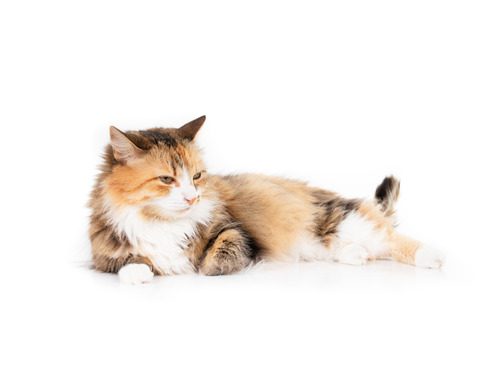If you’ve recently noticed your cat’s eyes flicking from side to side or moving in unusual patterns, it’s normal to be concerned. This involuntary eye movement, known as nystagmus, can be unsettling to witness. Often described as “cat eye twitching,” it might indicate an underlying health concern that calls for professional attention. At Mills Animal Hospital in Marietta, GA, our veterinary team is help you understand what could be behind these sudden eye movements. If you see signs of cat eye twitching, please call us at (770) 988-6698 to schedule an exam.

What Is Cat Eye Twitching?
Cat eye twitching, or nystagmus, refers to repetitive, uncontrolled eye movements that typically occur in a horizontal or vertical direction. This movement is not voluntary, and it usually appears in both eyes. In cats, it may signal an issue affecting the vestibular system, which plays a key role in balance and spatial orientation.
These eye movements are not a minor quirk. Cat eye twitching can point to serious health problems ranging from ear infections to neurological conditions. Observing how the eyes move and whether other symptoms are present helps your veterinarian narrow down possible causes. This is why prompt evaluation matters.
How the Vestibular System Affects Eye Movement
The vestibular system in cats includes structures within the inner ear and brain that help control balance, coordination, and eye motion. When this system malfunctions, the brain may receive confusing signals, which can lead to abnormal eye behavior like cat eye twitching.
Central vs. Peripheral Vestibular Disease
Vestibular dysfunction falls into two categories:
- Peripheral vestibular disease involves the inner ear or the vestibular nerve. It’s more common and may result from infections, inflammation, or injury.
- Central vestibular disease affects the brainstem or cerebellum. Causes may include tumors, trauma, inflammation, or other neurological disorders.
Both types of vestibular dysfunction can lead to cat eye twitching, but central vestibular disease is generally more serious. Differentiating between the two requires a veterinary exam and possibly advanced imaging.
Common Causes of Cat Eye Twitching
Multiple conditions can trigger cat eye twitching. Some are relatively mild, while others can indicate significant health issues.
Ear Infections
A middle or inner ear infection is a common reason for cat eye twitching. Infections can disrupt the vestibular system and cause a range of symptoms including head tilting, loss of balance, and rapid eye movement. Cats with ear infections might also shake their heads or paw at their ears. You may notice a bad odor or discharge coming from the ear canal. Treating the infection can resolve the symptoms, but an early diagnosis is important to avoid complications.
Toxins and Medications
Exposure to certain toxins or side effects from medications can result in neurological symptoms, including cat eye twitching. Some antibiotics and anti-parasitic drugs, if used incorrectly or in high doses, can affect the central nervous system. Always follow your veterinarian’s instructions precisely when administering medications.
Neurological Disorders
Disorders affecting the brain can also lead to cat eye twitching. Inflammatory brain diseases, seizures, and even strokes may present with abnormal eye movement. In some cases, additional symptoms like disorientation, behavioral changes, or seizures may occur.
Trauma
Head injuries or trauma to the inner ear can disrupt the vestibular system. If your cat has recently fallen, been hit, or experienced a physical injury, eye twitching may result. Even if your cat appears outwardly fine, internal injuries can still be present.
Congenital Conditions
Some cats are born with vestibular disorders that cause lifelong symptoms, including cat eye twitching. Kittens with congenital vestibular disease may develop normally in other ways, but they might always have a tilted head or coordination challenges. These cases are rare but possible.
What to Expect During a Veterinary Visit
If your cat is showing signs of cat eye twitching, a veterinary visit is essential. Diagnosis typically begins with a physical exam and a thorough medical history. Your vet may ask when the eye movements started, how frequently they occur, and whether you’ve noticed other symptoms like vomiting, loss of appetite, or difficulty walking.
Diagnostic Tools
Depending on the exam findings, your veterinarian may recommend:
- Otoscopy to inspect the ears
- Blood tests to evaluate internal health
- Neurological examination to assess reflexes and coordination
- Imaging (CT or MRI) if a central vestibular issue is suspected
These steps help identify the underlying cause of your cat’s eye twitching and guide treatment recommendations.
Symptoms That May Accompany Cat Eye Twitching
Cat eye twitching rarely happens in isolation. Additional symptoms can give you and your veterinarian more context. Recognizing these signs can help with early diagnosis and more effective treatment.
Other Symptoms to Watch For:
- Head tilting
- Loss of balance
- Nausea or vomiting
- Circling or falling
- Unusual eye positioning (strabismus)
- Hearing loss
- Disorientation
If any of these symptoms appear alongside cat eye twitching, the condition may be affecting your cat’s comfort and safety. Seek veterinary care as soon as possible.
Can Cat Eye Twitching Be Treated?
Treatment depends entirely on the cause of the eye twitching. In cases of infection, antibiotics or antifungal medications may be prescribed. If the condition is related to a toxin, removing the source and providing supportive care can help. Neurological conditions may require more advanced management or referral to a veterinary neurologist.
Long-Term Outlook
Some cats recover fully once the underlying issue is resolved. Others may experience ongoing symptoms, especially if the vestibular system sustained damage. Your veterinarian will discuss the likely prognosis after identifying the root cause. While not every case of cat eye twitching signals a serious health problem, none should be ignored. Early intervention often leads to better outcomes.
Why Prompt Care Matters for Your Cat
Cat eye twitching can be unsettling to witness, and it often raises more questions than answers. While it might look like a small issue, this kind of eye movement can point to larger problems affecting your cat’s balance and brain function. The sooner you schedule a veterinary visit, the sooner you can get clarity about what’s happening. If you’ve noticed cat eye twitching in your pet, call Mills Animal Hospital in Marietta, GA today at (770) 988-6698. Our experienced team will provide a thorough evaluation and compassionate care tailored to your cat’s needs.
